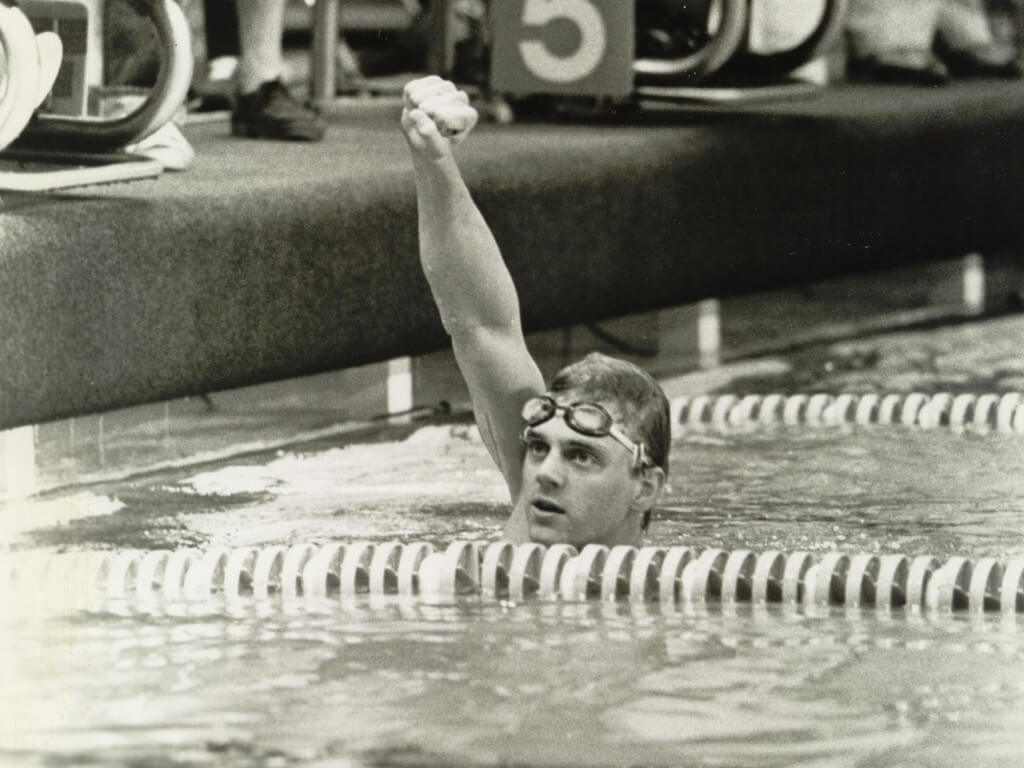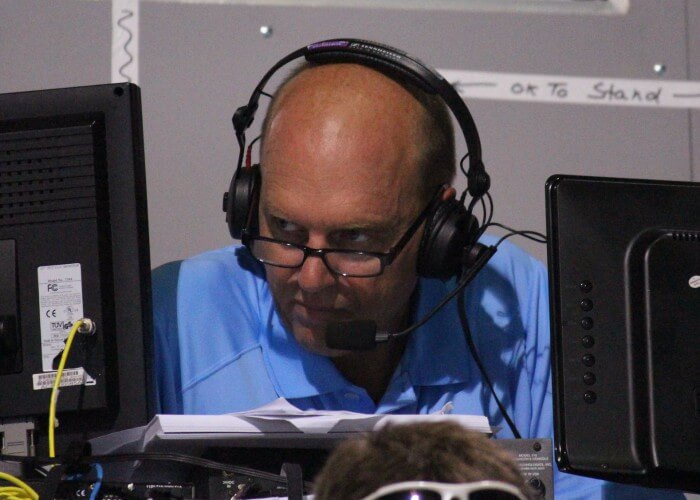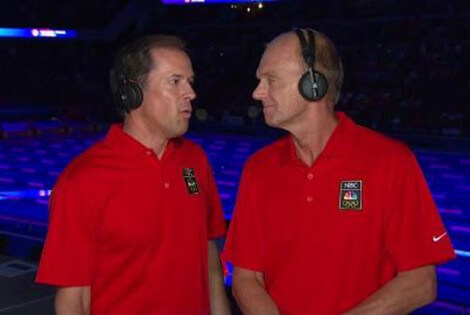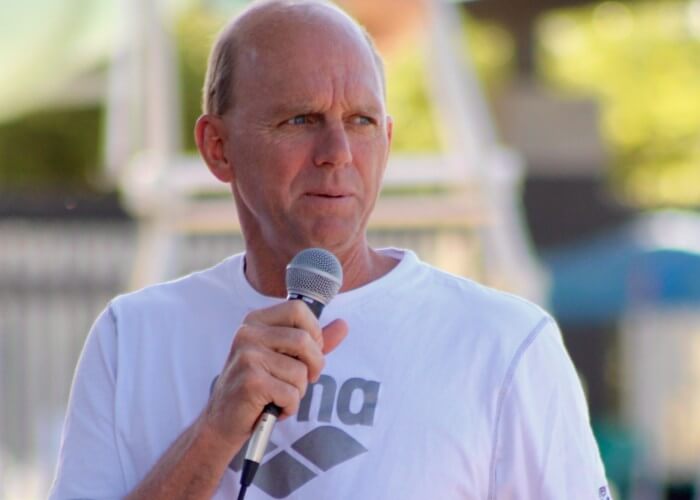Throwback Thursday: Rowdy Gaines Knows Dreams Can Be Worth the Wait

Rowdy Gaines – A Wait Worth It
As Swimming World continues its Great Races Series, we offer a look at the final of the men’s 100-meter freestyle from the 1984 Olympic Games in Los Angeles. Here is the story of Rowdy Gaines, who endured the boycott of the 1980 Olympics to achieve Olympic glory, with a twist to the race that made it happen.
Through history, sports and politics have frequently run along parallel lines, their paths eventually colliding with ugly results. There has been no bigger stage for these clashes than the Olympic Games, the quadrennial event which brings together countries with differing governments, cultures, socioeconomic statuses and religious beliefs.
At the 1936 Olympics in Berlin, Adolf Hitler used Germany’s role as host to promote the Nazi party and its ideals, and to especially emphasize his perceived superiority of the Aryan race. While Hitler had a global forum, his plan was significantly hindered by American Jesse Owens. As Hitler looked on, the African-American track star short-circuited any suggestions of Aryan supremacy by winning four gold medals in dominant fashion.
Thirty-two years later, the United States’ Tommie Smith and John Carlos ran to gold and bronze medals, respectively, in the 200-meter dash at the 1968 Olympics in Mexico City. But it’s their actions during the medal ceremony, not their speed, which are remembered most. In protest of civil rights inequality for African-Americans, Smith and Carlos each bowed their heads and raised a black-gloved fist into the air, a known symbol for black power, during the playing of the Star Spangled Banner. They also stood only in black socks, meant to represent black poverty.
The actions of Smith and Carlos were deemed inappropriate by many, including the International Olympic Committee. Under pressure from the IOC, the United States Olympic Committee suspended the athletes, who were subsequently thrown out of the Olympic Village. To this day, the picture of Smith and Carlos on the podium is an iconic image in Olympic history.
Olympic history, too, knows Rowdy Gaines. And Gaines knows the combustible relationship between athletics and politics.
As the 1980 Games in Moscow neared, Gaines was expected to be one of the American stars of the 22nd Olympiad, along with countrywomen Tracy Caulkins and Mary T. Meagher, among others. As a star for Auburn University, Gaines was surging at the right time, his peak performances seemingly destined for the Summer of 1980. If the blueprint unfolded according to plan, Gaines would be a gold-medal favorite in the 100 freestyle and 200 freestyle, and as a member of two United States relays.

Photo Courtesy: Griffin Scott
While Gaines was training for the biggest moment of his career, the Soviet Union invaded Afghanistan in December 1979 in support of the Afghan communist government’s conflict with anti-communist Muslim guerillas. A month later, United States President Jimmy Carter gave a speech which described several reactionary measures to the Soviet Union’s invasion of Afghanistan. One of the measures was a boycott of the Moscow Games if Soviet troops did not withdraw.
“Although the United States would prefer not to withdraw from the Olympic games scheduled in Moscow this summer, the Soviet Union must realize that its continued aggressive actions will endanger both the participation of athletes and the travel to Moscow by spectators who would normally wish to attend the Olympic games,” Carter said in his speech.
On March 21, 1980, the hammer dropped. Meeting with 150 American athletes, Carter announced the United States would officially boycott the Olympic Games. With that one decision, which was mimicked by 60 other countries, hundreds of American athletes saw their Olympic dreams crushed. Years of hard work, dedication and sacrifice went to waste. Gaines was one of the athletes who was robbed.
“I never believed for a moment that we would actually boycott,” Gaines said. “In fact, I was in denial all the way until they made the official announcement…I think the boycott was made for two reasons. One was to influence the (Soviets) to leave Afghanistan. The other was to try and move the Olympics out of (the Soviet Union). Neither one worked. If it truly would have helped the cause, then I would have been for it as well. But the old cliché of mixing politics and sports is so true. The (Soviets) used it to their advantage by winning more medals and the propaganda helped them tremendously and it ruined so many people’s athletic careers. The best thing we could do then was to go over there and kick their ass.”
Like many athletes of the era, Gaines faced decisions in the aftermath of the boycott. Following his senior year at Auburn, Gaines had to decide whether to continue with the sport and pursue a berth to the 1984 Olympics in Los Angeles or retire. It wasn’t an easy decision considering what Gaines had accomplished in the preceding months. Simply, he was on the finest roll of his career.
In addition to setting a world record in the 200 freestyle ahead of the 1980 Olympics, Gaines set a world record in the 100 freestyle in 1981. But for a six-month period after his senior year of college, Gaines couldn’t see sticking with the pool through 1984. At the time, the end of a collegiate career typically coincided with retirement, due to the truly amateur status of the sport. For Gaines, it was time to walk away.
At least temporarily.
“It was a very difficult decision,” Gaines said. “In fact, I retired after my senior year in 1981 because that’s what you did back then. There was no swimming after you graduated from college because there was no money. I wasn’t even allowed to accept money. It was still truly an amateur sport back then. After being retired for those six months, my father came to me and said that I would have a hard time the rest of my life looking in the mirror and saying ‘what if’ and he was right, I didnt want to have that feeling. It was not easy though. I worked as a night clerk in a hotel to try and make some money to survive, lived in a hovel and survived on mac and cheese. But there were a lot of us doing that so there was a camaraderie with those that were boycott babies.”

Photo Courtesy: Universal Sports
Gaines’ comeback from his brief retirement got off to a positive start, with Gaines breaking his world record in the 200 freestyle at the United States World Championships Trials in July of 1982. He followed by winning silver medals at the World Champs in the 100 freestyle and 200 freestyle and anchored three gold-medal-winning relays.
But the next summer didn’t produce the results Gaines was chasing. While he won the 100 freestyle and was the bronze medalist in the 200 freestyle, the performances lacked the pop which was a familiar trademark. With the Olympic Games – and redemption – a year away, Gaines hardly put fear into his rivals. More, questions began to creep into Gaines’ mind.
“I sort of felt (doubt) in the summer of 1983 after the Pan Am Games,” he said. “I swam really poorly there. It was the first time in such a meet that I didn’t improve my times. I didn’t even win the 200, the event in which I held the world record. I won the 100 and was on three winning relay teams, which sounds OK, but I knew the competition wasn’t that strong, not like it would be in the Olympics. For the first time, I felt old. I had doubts. I sat down with my parents, my coaches and my friends, all of whom really helped me. And in the end, I decided to go for it – win, lose or draw – because otherwise I would never know.”
The 1984 Olympic Trials didn’t exactly boost Gaines’ confidence, either. He didn’t even qualify for the Los Angeles Games in the 200 freestyle – individually or as a relay member – and he was only second to Mike Heath in the 100 freestyle, although that placement officially secured his Olympic invitation. Could Gaines get it together in time to excel in the biggest meet of his life? It was a legitimate concern.
The 100 freestyle was the first event of Gaines’ Olympic program and he was racing in a stacked field. Although the Eastern Bloc countries boycotted the Games in retaliation for what took place in 1980, Gaines had to deal with formidable competition in Heath, Australia’s Mark Stockwell and Sweden’s Per Johansson. A medal of any color was far from a guarantee, let alone a gold medal.
As Gaines was preparing for the final, he was approached by his coach Richard Quick and told to prepare for a quick start by the referee, Francisco Silvestri of Panama. Not just one of the greatest coaches in the world, Quick was attentive to details. From what he witnessed at the 1982 World Championships and 1983 Pan American Games, Quick knew Silvestri had a quick trigger when starting races and wanted Gaines to be alert for a similar outcome.
Indeed, Quick’s advice paid dividends. After the finalists in the 100 freestyle climbed the starting blocks, Silvestri’s reputation played out. As many of the swimmers were still moving downward to the “set” position, Silvestri fired his starter’s pistol. Ready for the quick fire, Gaines surged off the blocks and immediately bolted to a half-body length lead. Meanwhile, Stockwell was left behind, with Heath even farther back.
Gaines made the turn at the halfway mark in front of the pack, and aware of his lead. As he made his way down the last lap, he kept reminding himself to dig deep and push as hard as he could in what would be the last individual race of his career. Although Stockwell was closing during the final strokes, Gaines got to the wall first in 49.80, with Stockwell earning the silver medal in 50.24. Johansson placed third in 50.31, just ahead of Heath in 50.41.
After turning to read the scoreboard, a jubilant Gaines threw his head back and jumped into the air, thrusting his right arm upward. Four years after what should have been his handshake with Olympic glory, Gaines recognized his career dream.
“Part of me feels like it was yesterday,” Gaines said. “I can remember specific details of the race. But another part me feels like that was another person. I’m not sure how I did all that. It would have been impossible without Richard Quick. He had such a knack for picking up things to help his athletes, and that’s what he did with the start. But more than a coach, he was always a confidant and friend.”
The excitement of Gaines was equally matched by the anger of Stockwell and Heath. The Australian, knowing he wasn’t set for the start of the race, twice slammed his fist against the wall, but then congratulated Gaines. The Australian delegation filed a protest on Stockwell’s behalf, but it was denied. As for Heath, he congratulated Gaines before exiting the pool irate with the start and the way it cost him early ground.
“I don’t want to take away anything from Rowdy,” Stockwell said. “I mean, he’s great. He’s been around for a long time and he knows what to look out for. It just wasn’t a fair start.”

Photo Courtesy: Taylor Brien
Gaines’ might have been forced to wait for his Olympic experience, but he certainly got the most out of the occasion. After winning the 100 freestyle, Gaines powered the United States to gold medals in the 400 freestyle relay and 400 medley relay, giving him three victories on his home soil. However, it wouldn’t be the last of his Olympic dalliances.
Following his athletic career, Gaines became involved in broadcasting and has been a commentator at every Olympic Games since 1992. The 2020 Olympics in Tokyo marked his eighth Olympiad behind the microphone. Listening to a broadcast in which Gaines is involved leaves no doubt about his genuine care for what is taking place in the pool. He is highly excitable, his voice frequently rising to a crescendo as a down-to-the-wire race is decided at the wall.
Although some fans of the sport object to Gaines’ approach, he doesn’t apologize for his style. Enthusiasm is his calling card. Perhaps his most-famous call was at the 2008 Olympics in Beijing, when Jazon Lezak anchored the United States to an improbable victory in the 400 freestyle relay, in the process keeping alive Michael Phelps’ pursuit of eight gold medals.
“The first and foremost thing I try to bring to my announcing is passion,” Gaines said. “People can question some of my knowledge and my language or grammar, but they can’t question my passion. I hope that’s something that comes across because it’s genuine and I love doing it. I have the best seat in the house.”
An affable man who remains active in operating swim clinics, Gaines is one of the most recognizable faces of the sport. He can tell stories about races he has witnessed and ones in which he has taken part. It would be difficult to find a better story than the tale of his 1984 gold medal, which capped a journey from heartache to elation.
“I’ll tell you the truth. I was preparing my loser’s speech,” Gaines said of 1984. “I felt if I lost, I would come out and be gracious. I was going to say that I thought I had contributed to the sport and that I’ve got nothing to be ashamed of. It would hurt for the rest of my life. But I would have said it was worth it.
“(Olympic Coach Don Gambril) realized that I needed to stick around for my own sense of sanity. I think if I had quit, 20 years down the line I would have jumped out of the 20th floor, just from wondering if I could have made it or not. I felt in my heart that I needed to do this. He asked me if it was worth it. I told him, yeah, it was worth it. I’d go through another four years for this feeling. There’s so many of us who have been around for so long (since the 1980 boycott). You might get tired of hearing it, but we went through hell in 1980. But it was worth it.”




It was an unfair start.
Only Gaines knew it would be the fastest start of the games!!!
Not so. There is more to the story. Richard Quick held a team meeting the second day of the Games to let the coaches and athletes know of the fast starter from Panama. An important detail!
Agreed, should have been called back
Part of sport is paying attention to the details and being prepared.
Fair start or not, it was a victory of about half a second, which is substantial in the 100 Freestyle. I feel better about discounting the start issue with that length of victory. (And I love his announcing style … I can hear him when I’m breathing to the right … sometimes corny but always engaging!)